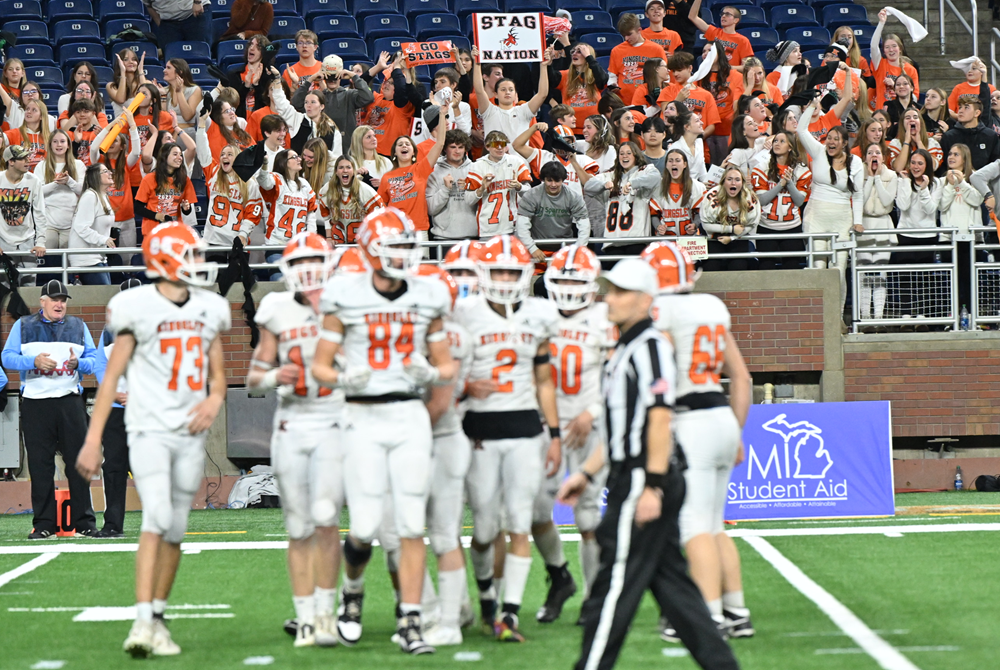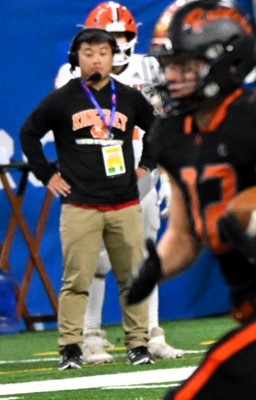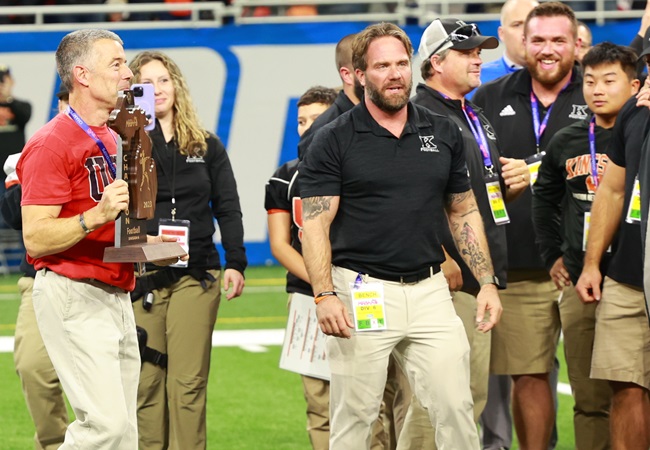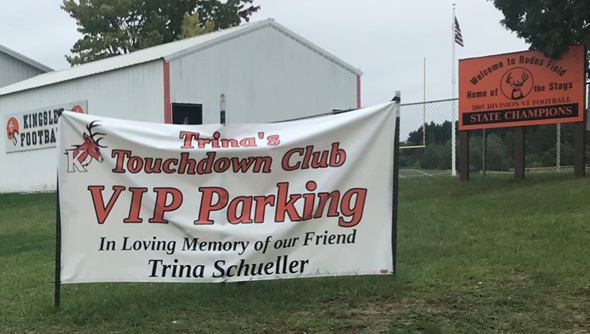
Valued Leaders Talk Sportsmanship
April 12, 2013
By Rob Kaminski
MHSAA benchmarks editor
Anyone who has attended an MHSAA sporting event has undoubtedly heard the public address announcements touting sportsmanship.
Sportsmanship is one of many lessons taught through school sports. But are today’s student-athletes the willing pupils in the subject? Or are too many kids opting for elective courses in showmanship offered via YouTube and cable networks?
While many involved in high school athletics have noticed a decline in sportsmanship, it’s not too late to inject this valuable ingredient back into our games. But efforts need to begin at the local level, and the scholastic environment needs to supplant community venues where poor sportsmanship often flourishes.
Seventeen coaches from all over the state chipped in to a benchmarks town hall discussion on sportsmanship.
East Kentwood’s Dave Emeott: “I think it is easy to see that sportsmanship is at least diminished. I think sportsmanship starts in the home, but we cannot always depend on the household to teach these lessons. As we sit in the stands, we realize that if this is where they learn it, then we need to get to work. I think we need to teach parents what a good sport looks like, as well as students. It is apparent that students will be the kind of sports they are permitted to be. Most coaches want good sportsmanship, but struggle with the balance of teaching character and winning or losing.”
Middleville Thornapple-Kellogg’s Tamara Benjamin: “Sportsmanship could be endangered. If a parent is allowed to sit in the stands and berate coaches, officials, and other athletes, it’s difficult for our students to see that this behavior is wrong because it is being tolerated. My expectations for our girls’ behavior are made clear the first day of practice. I hold them accountable for themselves, and we go forward each day.”
Holland’s Don Kimble: “I believe that it starts at home; always looking for a reason for failure opens the door to unsportsmanlike behavior. On our team, sportsmanship is stressed within the team first; if you cannot be a sportsman to your teammates, then you cannot be to others.”
Grand Haven’s Kimberly Vincent: “We’re all about sportsmanship and work with students and parents to set expectations. There are too many people pointing fingers at other people about this subject, and I think coaches have to set the example.”
Battle Creek Pennfield’s Mike Roach: “Youth sports programs need to concentrate on sportsmanship and the fact that there are winners and losers in sports. By not keeping score, the kids do not learn how to win, nor do they learn how to handle losing. Keep score. Teach kids that it is not the end of the world to lose, but be gracious in winning and losing.”
***
It could be true that much of the focus on poor sportsmanship is a result of just that: the spotlight on poor sportsmanship, rather than the good.
Thornapple-Kellogg’s Abby Kanitz: “I think that too much focus is put on the unsportsmanlike situations. There is much more good out there than bad; it just doesn't make for great stories. It does not take much more than one bad situation to ruin a game, competition or meet. I think sportsmanship comes from the coach. If your athletes know you have high expectations in this area, then their parents will know, too.”
Allegan’s Gary Ellis: “Sportsmanship is alive and well, though it is under attack. Students are exposed to so many examples of poor to horrendous sportsmanship on TV, that it seems to be the norm.”
Bloomfield Hills Andover’s David Zulkiewski: “I see positive sportsmanship every day with my athletes, and that’s because we focus on it and make it part of our daily practice and competition. Our team is much more than swimming or diving; it’s about excelling at life. So many of our kids will not compete in athletics after high school, so we try to give them skills they can use in the real world. Being a good sport is one of those skills.”
Grand Haven’s James Richardson: “Kids want and need structure, and will uphold the guidelines as long as they are clearly defined and enforced consistently. As coaches we need to build relationships with the kids and teach them proper behavior, and serve as models for them.”
Holt’s Mike Van Antwerp: “Sportsmanship is still around. If kids respect their opponents as individuals, they are good sports. Most of them would get along well if they were on the same team, so it’s important they realize that. The kids they play against are no different from them. If they respect the game, respecting their opponent follows.”
***
To be sure, no coach worth his or her clipboard sets out to allow poor sportsmanship. But emphasizing proper conduct early and often should be as essential as conducting tryouts.
Munising’s Cathy Mutter: “Sportsmanship is an important part of high school sports and life in general. I always tell my athletes, ‘You do not deserve; you earn. You have to work hard, be positive and be fair.’ I teach them to strive to be the best they can be on the team, in the classroom, at the jobs they have, and at home in their family life. Many programs struggle due to the fact they do not work together as a unit. You are only as strong as your weakest link.”
Rockford’s Ed Van Portfliet: “The O-K Conference and the member schools have done a great job of promoting sportsmanship, and I think it’s alive and well in our area. We teach our players it’s important to play hard, but they also have to respect their opponent and the game. We don’t tolerate actions or play from our players that would be considered disrespectful or detrimental to the game.”
Warren Regina’s Diane Laffey: “We always talk sportsmanship at our team meetings, our parent meetings and our coaches meetings. I guess it is an endangered species in some areas – but I do not feel it has gotten anywhere near that point at our school. I make every effort to make sure that our athletes, teams, coaches and parents keep sportsmanship at the top of our list.”
Allegan’s Ellis: “Leagues have a responsibility to educate their students about proper behavior at high school athletic events and how to treat their opponents. Schools need to develop leaders – on teams and in the stands – who set the tone at contests. The biggest trophy given out at our year-end awards night is the sportsmanship trophy.”
Marshall’s Sue Hutchings: “Sportsmanship starts with the coaching staff respecting the players and hammering the philosophy home. If one of our players exhibits bad sportsmanship, they are taken out of the competition and made to apologize. And trust me, it has happened. Our conference coaches are all pretty tight and have worked together for a number of years. We all share the same philosophy and have very, very little trouble with bad sportsmanship.”
***
Sometimes, proper sportsmanship is simply woven into the fabric of a given sport.
Grand Rapids Forest Hills Northern/Forest Hills Eastern’s Brian Telzerow: “Sportsmanship in golf is the leader in integrity. There is no other sport that is as self-policing as is golf. The young men and women must play with honor and integrity, calling penalties on themselves with no referees present. There is no entitlement here. After we play, players shake hands with all other competitors in their groups. We also make it a practice to say thanks to the host team and to the host course personnel. This is intentional to instill gratitude for the privilege of playing this sport.”
Portland’s Jim Niebling: “Sportsmanship may very well be endangered, but not in high school tennis and certainly not on our teams in Portland. Just this season my No. 1 singles player was playing his arch rival in the league championship match. They had gone back and forth for years and both knew the implication of winning the match for the upcoming Regional and Final tournaments where they were surely going to have to play again. The loser would be seeded lower and would have decidedly more difficult draws. But when the other player, up a set, began to cramp in the second set, looking like he may not be able to finish the match, my player walked to his cooler, pulled out a Gatorade and handed it to his opponent.
“My player ended up losing that match, and he knew that was a possibility when he handed his opponent that Gatorade. If that’s not sportsmanship, I don’t know what is.”
Grand Haven’s Richardson: “Sportsmanship is promoted on our team because in wrestling we are only in charge of ourselves and our actions. It’s a sport that holds individuals accountable. It is difficult in our sport to place blame on others.”
Grand Rapids Kenowa Hills/Grandville’s Brenda McDonald: “I always have my girls practice good sportsmanship. They always thank the home team or say, ‘Good job,’ to the opposing team. Many of the girls know the girls on other teams from previous gymnastics classes, so they enjoy seeing them again.”
High School Coaches Survey Identifies Parental Concerns
More than 3,000 high school coaches and athletic directors responded to a nationwide survey conducted by Growing Great Relationships (GGR) in cooperation with the National High School Coaches Association (NHSCA). The purpose of the survey was to understand what coaches and athletic directors see as their greatest needs concerning coach-parent and coach-athlete communication and relationships. GGR and NHSCA will use the results to design training and programs that address the identified needs.
The first section of the survey addressed issues surrounding parents of athletes. The first question asked coaches about their greatest concerns dealing with parents. More than 50 percent indicated over-involved parents as their No. 1 concern.
The second question asked coaches what they think parents are most concerned about. Overwhelmingly, nearly 80 percent reported the child’s amount of playing time as their perception of a parent’s biggest issue.
The next question asked coaches who are the most difficult parents. Athlete “wanna bes” were identified by 55 percent of the respondents.
Coaches then were asked what parents should do to support them. More than 70 percent indicated keeping them informed of personal difficulties their child was having at home. This was followed by 63 percent asking parents not to use social media regarding the team, or to gossip about the team or the coach’s expertise. Athletic directors’ responses were similar but with different percentages. Nearly 73 percent ranked not using social media or gossip about the team as the most important.
The second section of the survey asked coaches about their greatest concerns regarding relationships with their athletes. The first question asked coaches about the challenges they face communicating with student-athletes. Nearly 58 percent indicated an athlete receiving contradictory advice from parents and other coaches/advisers. This was followed closely with 55 percent stating an athlete’s inflated belief about his or her ability. Athletic director responses were similar but with somewhat different percentages. The greatest response, 70 percent, was the athlete receiving contradictory advice.
The second question asked the coaches for other factors interfering with their relationships with their student-athletes. The factor indicated by 58 percent of coaches was an athlete over-burdened with competing school demands (clubs, academics). For this particular question, the response from the athletic directors closely matched the coaches.
Athletic directors were asked that in their role what are their greatest concerns dealing with parents and athletes. The most frequent answer by 76 percent of athletic directors was parents bypassing coaches to complain directly to them.
In addition, nearly 500 coaches and athletic directors wrote in additional concerns that they have in their ability to communicate and work with athletes and their parents.
– Richard & Jane: Relationship Coaching

Football Title Reflects Kingsley's Current Success, Recalls Loved Ones Passed
By
Tom Spencer
Special for MHSAA.com
December 1, 2023
Kingsley football fans have become pretty familiar with VIP parking for home games over the last couple of seasons.
 They may just start looking for a Kingsley VIP lot at Ford Field. The Stags just captured the MHSAA Division 6 championship trophy with a 38-24 victory over Almont, their second Finals championship and first since 2005.
They may just start looking for a Kingsley VIP lot at Ford Field. The Stags just captured the MHSAA Division 6 championship trophy with a 38-24 victory over Almont, their second Finals championship and first since 2005.
The road to the Finals started with Kingsley hosting two playoff games, allowing great use of the VIP Parking of Trina’s Touchdown Club. The lot is adjacent to the school’s Rodes Field and provided in loving memory of Katrina “Trina” Kay Schueller, who passed away Oct. 21, 2021, at Munson Medical Center.
Those playoff games filling Trina’s Touchdown Club’s parking lot featured wins over Mason County Central 61-12 and Manistee 37-18, and 51-27 over Gladstone in the Regional Final. Kingsley then traveled down the road and defeated Reed City 37-7 in the Semifinal.
There may not have been designated VIP parking in Cadillac and Ford Field for the Stags’ followers, but there were a lot of VIPs at both stadiums with Schueller on their minds. Pretty much everyone with an affiliation with the highly-successful program or familiarity with the community’s struggles have become VIPs to the Kingsley coaching staff and many others.
Most certainly among the VIPs are head coach Tim Wooer, assistant coach Conner Schueller, his brother Carter Schueller, and his father Mike Schueller.
Conner was set to play the biggest regular-season game of his career the day after his mom passed. It was the regular-season finale against rival Traverse City St. Francis.
Wooer vividly remembers the moments leading up to that matchup, noting how difficult it was for Conner. But his then-fullback and now-assistant coach demonstrated amazing strength and maturity he stills exhibits today.
 “He’s in his senior football season, and his mom is in the hospital for four weeks — he’s balancing that playing football and going to school,” Wooer recalled. “And then she passes, and he has the strength to come back to school and deliver the news to our team.
“He’s in his senior football season, and his mom is in the hospital for four weeks — he’s balancing that playing football and going to school,” Wooer recalled. “And then she passes, and he has the strength to come back to school and deliver the news to our team.
“I am sobbing watching this kid, and I’m just amazed,” Wooer continued. “The next night is Parents Night, and he’s on the field with his dad and brother without his mom.”
Conner still played, making a 4th-down goal line tackle to prevent a St. Francis touchdown. The Gladiators won the game, but Conner won the day, conquering much just to dress for the game.
The Stags went on to playoff wins over Kingsford 28-10 and Clare 32-6. They bowed out with a 33-18 Regional loss to Frankenmuth.
Conner’s junior year of 2020 had been cut short as the Kingsley was forced to forfeit its District Final to Reed City because several players and coaching staff tested positive for COVID-19. The Stags had Ford Field in their minds that season too after playoff wins over 38-13 Standish-Sterling 38-13 and Gladwin 63-16.
Conner, who celebrated his 20th birthday at Saturday’s Final, remembers his playing days and the challenges presented him.
“At the time it was ‘she’s not there,’ especially my senior year she wasn’t there to watch me and finish it out, but I know she’s watching above,” he said. “We were about to go play Reed City my junior year for Regionals, and everyone got sick and it ended our season unfortunately.”
Those challenges were on his mind at Ford Field, and running through his mind when he saw his brother and father in the stands. Carter, now a senior at Kingsley, had been unable to play football due to injuries.
“I thought about my brother – he unfortunately didn’t play this year due to his injuries, and I don’t really blame him for that,” Conner said. “I thought about him as well because it was just me and my dad and my brother now.
“It was very emotional,” Conner continued. “I got a glimpse of him in the strands.”
Carter also was filled with gratitude for the coaching staff for welcoming and mentoring him. He had become keenly aware of the amount of time coaches spend away from family at practices and going through film.
In addition to his family, Conner was thinking about many others in the Kingsley community – and other senior classes like his that didn’t get the chance to celebrate a championship.
He also was thinking about Justin Hansen, a 2003 graduate of Kingsley. Hansen was a captain on the 2002 conference championship team. He went on to become a special-operations Marine sergeant and was killed in action July 24, 2012, while deployed in Afghanistan. Hansen was on patrol as part of an operation in search of a high-value target when his team was hit with small arms fire.
 On Saturday, Wooer was wearing a red T-shirt with the letters “USA” on the front and the name “Hansen” on the back. It also featured the number 54, Hansen’s in high school.
On Saturday, Wooer was wearing a red T-shirt with the letters “USA” on the front and the name “Hansen” on the back. It also featured the number 54, Hansen’s in high school.
Wooer, who turned 54 in July, wore the shirt in Hansen’s memory knowing Hansen would be on the veteran coach’s mind and symbolizing Hansen’s presence with the team at Ford Field.
Wooer wants to make sure Hanson is never forgotten and reminds the soldier’s family the entire community remains behind them.
“I believe it is part of our job as a community to show our love to this family and help in any way possible to help them get through this process,” Wooers said. “After the funeral, we all went about life.
“We certainly still think about Justin and feel the pain,” he continued. “But nothing like a family does.”
Hansen’s tragic passing led to the creation of the annual Patriot Game in Traverse City in 2012 while Wooer was coaching Traverse City West. The game features crosstown rivals West and Traverse City Central every year and strives to honor veterans, first responders, active duty military, and area heroes who died while serving their country.
Saturday’s win over Almont left Wooer emotionally exhausted after all the preparations to do it right for the senior class, the school, the Kingsley community, the Schueller family and Hansen. Collectively, they’ve really become more like a family to the Stags coaching staff and many, many others.
“In terms of emotions, there is no doubt Justin was on my mind throughout the game,” Wooer said. “Trina and Conner have been – those are two huge pieces.
“And, a lot of my thoughts are with the seniors,” he continued. “You want to win the game, but also it is your last time with them.”
Wooer has learned a lot from his former players and coaches over the years. He’s become close friends with many of them, going back to his early days of coaching as a student-teacher at Elk Rapids. He also coached at Farewell and Traverse City West, the latter from 2008-2017 after a first tenure at Kingsley. He returned to Kingsley in 2018.
Schueller is among several former players and coaches who have been on Wooer’s coaching staffs over the years. Several continue today.
“I could give you lots of other stories about kids I have had,” Wooer said. “There comes this transition where they turn into such amazing men, you catch yourself every once in a while saying, ‘I want to be like him.’
 “You get this huge smile on your face because you’re so proud of them, just like a mother or father would,” Wooer continued. “A coach always looks at his players like they’re part of his family.”
“You get this huge smile on your face because you’re so proud of them, just like a mother or father would,” Wooer continued. “A coach always looks at his players like they’re part of his family.”
In addition to Conner, current assistants with long-term relationships with Wooer are Tom Kaleita, Kyle Smith, Ryan Zenner, Dan Goethals, Josh Merchant, Jordan Bradford, Steve Klinge, Connor Schueller, Mike Arlt, Larry Mikowski, Bobby Howell, Rob Whims and Jason Morrow.
This year’s seniors were Jon Pearson, Eli Graves, Skylar Workman, Gavyn Merchant, Max Goethals, Evan Trafford, Bode Bielas, Grant Kolbusz, James Person, Caleb Bott, Trenton Peacock, Noah Scribner and Gavin Dear. They and the coaching staff will be the center of attention as the community celebrates the football team at 7 p.m. this evening in the high school gymnasium.
The seniors probably won’t need VIP parking tonight. But if it would help, Conner would surely make arrangements to utilize Trina’s Touchdown Club. He’d have to add a shuttle though as Rodes Field is about a mile away from the school.
“It feels amazing — I don’t think it really hit any one yet, but I am sure it will,” Conner said. “After we won, it is truly something – it is something else I can’t explain.
“The seniors finally won it the way they were supposed to,” he continued. “It was a good class of seniors.”
 Tom Spencer is a longtime MHSAA-registered basketball and soccer official, and former softball and baseball official, and he also has coached in the northern Lower Peninsula area. He previously has written for the Saginaw News, Bay County Sports Page and Midland Daily News. He can be reached at [email protected] with story ideas for Manistee, Wexford, Missaukee, Roscommon, Ogemaw, Iosco, Alcona, Oscoda, Crawford, Kalkaska, Grand Traverse, Benzie, Leelanau, Antrim, Otsego, Montmorency, Alpena, Presque Isle, Cheboygan, Charlevoix and Emmet counties.
Tom Spencer is a longtime MHSAA-registered basketball and soccer official, and former softball and baseball official, and he also has coached in the northern Lower Peninsula area. He previously has written for the Saginaw News, Bay County Sports Page and Midland Daily News. He can be reached at [email protected] with story ideas for Manistee, Wexford, Missaukee, Roscommon, Ogemaw, Iosco, Alcona, Oscoda, Crawford, Kalkaska, Grand Traverse, Benzie, Leelanau, Antrim, Otsego, Montmorency, Alpena, Presque Isle, Cheboygan, Charlevoix and Emmet counties.
PHOTOS (Top) Kingsley students support their classmates during Saturday’s Division 6 Final at Ford Field. (2) Stags assistant coach Conner Schueller watches from the sideline during an Almont run back. (3) Kingsley coach Tim Wooer, in red, prepares to present the championship trophy to his team including Schueller, far right. (4) Trina’s Touchdown Club welcomes members to the VIP lot adjacent to the Kingsley stadium. (Ford Field photos by Hockey Weekly Action Photos; touchdown club photo courtesy of the Kingsley football program.)

